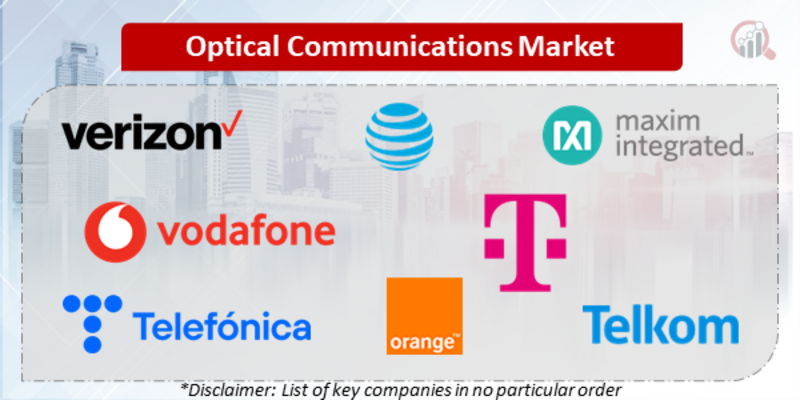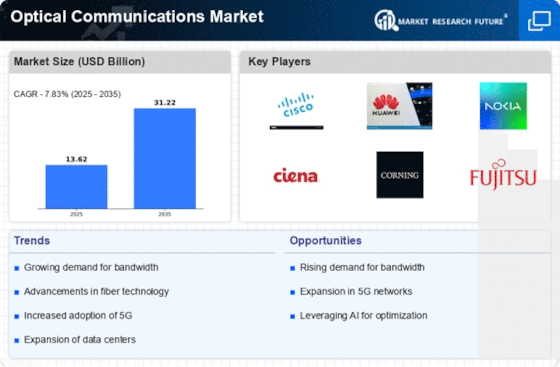Top Industry Leaders in the Optical Communications Market

Competitive Landscape of the Optical Communications Market:
The optical communications market, fueled by the insatiable demand for bandwidth, is traversing a dynamic and intensely competitive landscape. With data traffic surging due to 5G rollouts, cloud computing, and the metaverse, optical networks are the lifeblood of the digital age. Understanding the competitive dynamics within this market is crucial for established players and aspiring disruptors alike.
Key Players:
- Verizon Communications
- AT & T Inc.
- Maxim Integrated
- Vodafone Group PLC
- Deutsche Telekom AG
- Telefonica, S.A
- Orange
- Telekom SA SOC Ltd. (South Africa)
- Telstra Corporation Ltd.
- Singapore Telecommunications Limited
- Hetzner Online GmbH
Strategies Adopted by Key Players:
To stay ahead in this volatile arena, companies employ a range of strategies. Product diversification is key, with players expanding their portfolios beyond traditional hardware to include software suites for network control and optimization. Vertical integration, particularly in the manufacturing of key components like optical transceivers, is another common strategy to secure supply chains and cost advantages. Additionally, strategic partnerships and acquisitions are prevalent, enabling companies to access new technologies, markets, and expertise.
Market Share Analysis:
- Product Portfolio: Offering a comprehensive range of solutions across different segments, from access networks to long-haul infrastructure, is crucial.
- Regional Presence: Dominating key markets like North America, Asia Pacific, and Europe ensures access to high-growth areas.
- Customer Focus: Catering to specific needs of diverse customer segments, such as telecom operators, data center providers, and government agencies, is key.
- Pricing Strategies: Balancing competitive pricing with technological value proposition determines market penetration.
The Rise of New Frontiers:
- 5G and Beyond: The rollout of 5G and future iterations will further boost data traffic, demanding high-capacity optical networks.
- Cloud Computing and Data Centers: The growth of cloud-based services and data centers necessitates high-speed, scalable, and efficient optical infrastructure.
- Undersea Cables: Connecting continents with ultra-fast data pathways, undersea cables represent a significant growth area.
- Integration with AI and Machine Learning: Artificial intelligence and machine learning are poised to revolutionize network management and optimization, creating new opportunities for innovative solutions.
Latest Company updates:
Verizon Communications:
- October 26, 2023: Verizon announced a partnership with Ciena to deploy its WaveLogic 5 Extreme coherent optical platform across its network, aiming to increase capacity by 40% and reduce latency by 30%.
- December 12, 2023: Verizon launched its 5G Ultra-Wideband service in 17 new markets, leveraging its fiber network for faster speeds and lower latency.
AT&T Inc.:
- November 1, 2023: AT&T announced the completion of its 23,000-mile undersea fiber optic cable system, "Project UNITY," connecting the United States, Mexico, and Central America.
- December 5, 2023: AT&T launched its AirGig service, offering fixed wireless internet with speeds up to 5 Gbps using millimeter wave technology, potentially complementing its fiber-based internet offerings.









